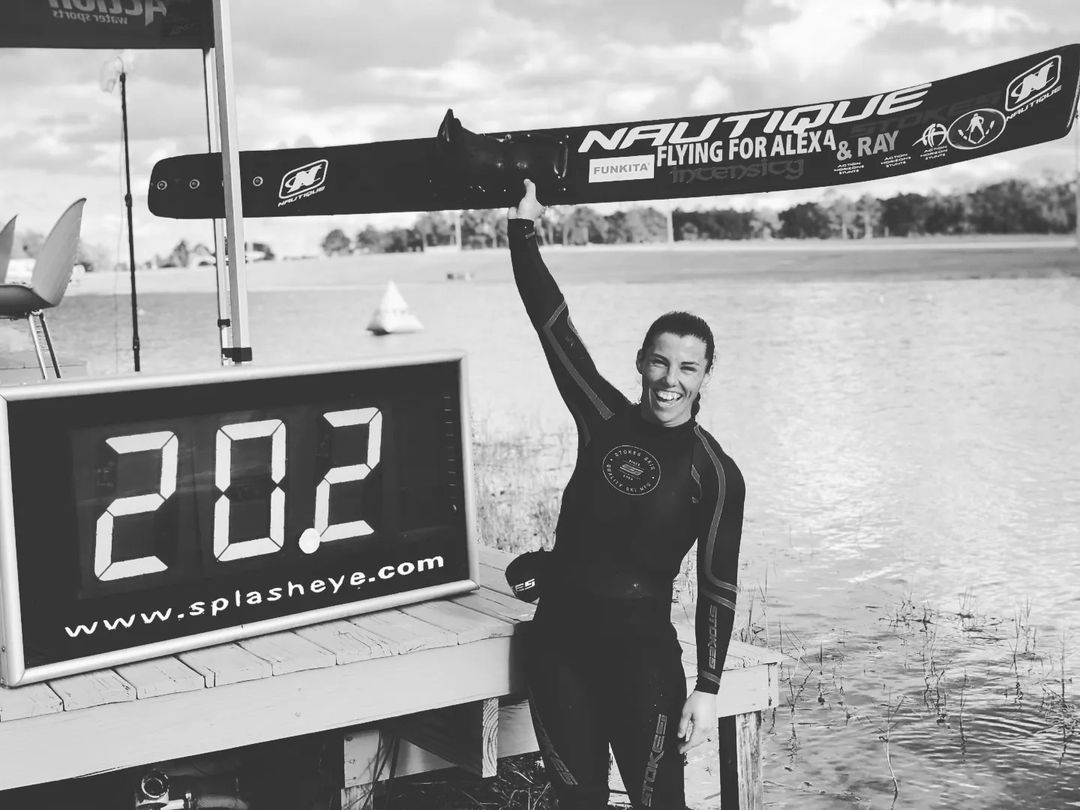Jacinta Carroll speaks out on Nautique sponsorship controversy

Carroll became the first woman to jump 200 feet at the 2021 MasterCraft Pro. (Image: @jacintacarroll)
By Jack Burden
Last year, Jacinta Carroll etched her name in history by achieving a remarkable milestone – becoming the first woman to jump 200 feet. However, this triumph comes with a bittersweet tale of dreams realized and unexpected setbacks, including being dropped by her major sponsor, Nautique Boats.
The journey to the 200-foot mark wasn’t just a physical feat for Jacinta; it was a deeply personal goal that had its roots in a poignant moment with her coach and mentor Ray Stokes, who was in the advanced stages of a terminal illness. Ray’s words, urging her not to change who she was and to break the barrier of a 200-foot jump, became the driving force behind Jacinta’s aspirations. A hand-drawn poster in her childhood bedroom, asking if she would be the first female to jump 200 feet, served as a constant reminder of this goal.
However, the path to this historic achievement was laden with challenges. Breaking a record demands the convergence of multiple critical factors— the boat, the driver, the site, the conditions, and the athlete’s performance. It’s a delicate dance of precision where all five variables must align perfectly to achieve the extraordinary.
Record-breaking opportunities proved elusive for Jacinta, potentially hindered by the prioritization of the men’s event in terms of the best drivers and conditions. The struggle intensified as she balanced her full-time job with her passion for water skiing, making it difficult to align all the necessary factors for a perfect jump.
Amid the Covid pandemic, international travel posed significant hurdles for the Australian athlete. During her limited stay in the U.S. for the 2021 World Championships, Carroll participated in six tournaments, including two within a single weekend, in her relentless pursuit of breaking the record.
The breakthrough moment unfolded at the Mastercraft Pro, her final tournament of the trip. Despite falling just short of the world record in the finals of the pro event, Carroll approached the officials, presenting her case for a bonus round. Jacinta’s plea was heard, and she seized the moment, achieving a jump of 202 feet – a distance mirroring the first male to accomplish this feat in 1983.
However, the triumph turned into bitterness when Jacinta disclosed that Nautique, her primary sponsor, opted not to renew her contract. This news was delivered to her while she was undergoing a two-week quarantine in isolation upon her return to Australia.
In an emotional recounting of the experience, Jacinta conveyed her disappointment at the absence of congratulations for her historic achievement. Instead, her major sponsor inquired if she regretted her decision to break the record behind a MasterCraft. Feeling disrespected, she questioned whether the situation would be the same if she were a male world record holder, pondering, “Is this just an easy way to get me off the books?”
“I tried and tried, and I just couldn’t get the five stars to align,” lamented Jacinta. “And at the end of the day, in 50 years, I’m not going to look back, I’m not going to regret [breaking the record]. Hell, I don’t even regret it now!”
As Jacinta contemplates her future in the sport, uncertain about competing on the worldwide stage again, her story sheds light on the challenges female athletes face. Not just in their pursuit of excellence but also in navigating the complexities of sponsorship and recognition within the industry.

